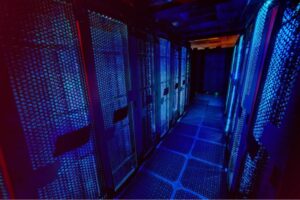Contents
Real-time location systems (RTLS) are gaining popularity in the logistics industry as they offer several benefits, including improved asset visibility, better process efficiency, and increased accuracy. However, the most significant advantage of RTLS is its potential to support environmental sustainability efforts.
RTLS enables companies to get data-driven insights into material flow and wastage within the supply chain, making it easier for them to reduce emissions and limit energy consumption. By understanding how products move throughout their journey, businesses can make informed decisions that positively impact human health and the environment.
In this blog post, we will delve into the significance of RTLS in logistics industry seeking to enhance their sustainability efforts.
The Role and Influence of RTLS in Logistics Industry

Real-time location services are increasingly important for logistics companies striving to improve their sustainability practices. By using RTLS in logistics industry, companies can track the exact whereabouts of their shipments in real-time, providing greater visibility and accuracy of their products. This reduces costs associated with missed deliveries or over-shipping due to inaccurate tracking data.
Additionally, RTLS technology can be utilized to decrease energy costs by utilizing smart, energy-efficient systems. For instance, by monitoring the temperature of products during transit, logistics companies can minimize the amount of energy required to cool or heat the cargo. This helps streamline their operations and save on energy expenses.
Overall, RTLS is a game-changer in the logistics industry as it provides real-time visibility into shipments, enabling businesses to make informed decisions based on accurate information and respond quickly to changes in the logistical landscape. This is particularly important for businesses that heavily rely on timely deliveries, such as online retailers or food delivery services.
Utilizing RTLS Technology to Foster Sustainable Practices in Logistics

RTLS systems are proving to be valuable tools for promoting sustainability in logistics businesses through the use of new, energy-efficient technologies. By deploying RTLS tags and sensors on vehicles, cargo, and containers, the movement of these assets can be closely monitored, providing crucial data that can be used to optimize routes, reduce fuel consumption, and streamline operations.
Moreover, the implementation of RTLS in logistics industry can help identify inefficiencies and process waste, which in turn can help reduce energy consumption. By using RTLS as an enabler of sustainability initiatives, logistics organizations can increase their efficiency while reducing emissions and their carbon footprints.
Thanks to the use of advanced location technologies, RTLS can be used to identify opportunities for reducing fuel consumption by merging multiple routes into one or shortening the route. This approach not only helps improve sustainability efforts but also saves time and energy while supporting green initiatives.
Another useful feature of RTLS is that it can be used to track asset movement. This allows companies to monitor and analyze usage patterns, identifying sustainable practices that can reduce emissions and save money on energy costs. By adopting RTLS in logistics industry, businesses can work towards creating a more sustainable industry that is better for the environment and society.
How Businesses Adopt RTLS for Sustainability Purposes
Logistics companies are turning to real-time location systems to enhance sustainability by implementing energy-efficient technologies. RTLS tags and sensors can be attached to vehicles, cargo, and containers, allowing companies to track their movements and gather valuable data that can be used to optimize routes, reduce fuel consumption, and streamline operations.
To better understand the benefits of RTLS in logistics industry to sustainability, let’s examine some real-world examples:
Route and Delivery Time Optimization
One logistics company used RTLS technology to track the movement of goods through its supply chain to identify areas where energy could be conserved. This enabled them to analyze the impact of their delivery times and adjust routes based on traffic, weather, and customer needs, thereby reducing emissions and saving fuel. The data also helped to develop a more efficient delivery network that minimized idling and vehicle emissions, while saving on fuel costs.
Temperature Tracking for Perishable Goods
Another company used RTLS to track the temperature of perishable goods by attaching tiny tags to each item, which sent out an infrared signal that was picked up by sensors throughout the warehouse. This allowed staff to quickly identify items that had become too warm or cold, reducing spoilage and waste. The technology also enabled the company to better manage its inventory, increasing sustainability by reducing food waste and energy costs.
Baggage Cart Location Tracking
An airline company leveraged RTLS to track the location of baggage carts in real time throughout airports using a combination of RFID tags and beacon signals. This increased the efficiency and accuracy of their baggage handling process while reducing fuel and energy usage.
In addition, RTLS can help identify inefficiencies and process waste, enabling logistics organizations to reduce energy use and support green initiatives. With the implementation of RTLS in logistics industry, businesses can work towards creating a more sustainable industry that benefits both the environment and society.
If you’re interested in learning more about companies that have implemented RTLS in logistics industry for sustainability purposes, Litum has a collection of case studies and reports that we can share.
Barriers to RTLS Adoption for Sustainability Purposes

When businesses implement RTLS technology to increase sustainability, they face several challenges related to implementation and usage.
The implementation and usage of RTLS technology in sustainability efforts might pose some challenges for businesses. Firstly, it is important to understand how the technology works and its potential uses. Proper configuration of the system is also essential to ensure it functions correctly. Additionally, stakeholders should be informed about the system’s capabilities and limitations.
Another significant challenge is the cost of implementation. Although RTLS technology can increase efficiency and provide valuable data to support sustainability efforts, it requires significant upfront investment. Therefore, businesses should consider the investment required to implement and maintain the system correctly.
Finally, businesses should ensure their network infrastructure can handle the data processing needed for RTLS technology. Failure to update the infrastructure may result in not receiving the full benefits of RTLS implementation. By ensuring that their network infrastructure is up to date and capable of handling the necessary processing power, businesses can ensure that RTLS technology provides maximum sustainability benefits.
How Litum Helps Improve Sustainability in Your Logistics Processes
Litum’s RTLS technology enhances the sustainability of logistics operations by precisely tracking assets in both indoor and outdoor spaces, improving efficiency, and monitoring transit times and other operational factors. This ultimately leads to cost and emission savings by eliminating wasteful practices such as unnecessary transportation and manual searching.
Furthermore, RTLS technology helps organizations reduce their environmental impact by monitoring the condition of assets in transit to prevent damage or loss. This helps to reduce waste associated with returned goods due to damage or incorrect delivery.
All of these benefits combined lead to a more sustainable and efficient logistics process. With Litum’s RTLS technology, organizations can monitor and optimize their operations with real-time data, leading to more sustainable practices and a greener world.
To learn more about the various RTLS in logistics industry, please contact us today.






